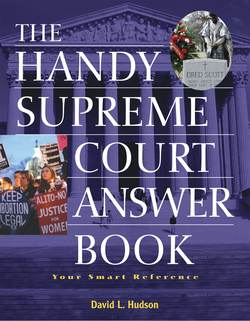Читать книгу The Handy Supreme Court Answer Book - David L Hudson - Страница 185
На сайте Литреса книга снята с продажи.
Who argued the case for Alexander Chisholm?
ОглавлениеRemarkably, U.S. attorney general Edmund Randolph argued the case as a private attorney on behalf of Alexander Chisholm. In those days, government attorneys could supplement their income by taking private cases. Randolph was unopposed by the state of Georgia. The Supreme Court reporter, Alexander Dallas, submitted a written response from the state’s lawyers but no one personally appeared to argue on the state’s behalf.
CourtSpeak: Chisholm v. Georgia State vs. State Case (1793)
Chief Justice John Jay (majority): “If we attend to the words, we find them to be express, positive, free from ambiguity, and without room for such implied expressions: ‘The judicial power of the United States shall extend to controversies between a state and citizens of another state.’ If the Constitution really meant to extend these powers only to those controversies in which a State might be Plaintiff, to the exclusion of those in which citizens had demands against a State, it is inconceivable that it should have attempted to convey that meaning in words, not only so incompetent, but also repugnant to it; if it meant to exclude a certain class of these controversies, why were they not expressly excepted; on the contrary, not even an intimation of such intention appears in any part of the Constitution. It cannot be pretended that where citizens urge and insist upon demands against a State, which the State refuses to admit and comply with, that there is no controversy between them. If it is a controversy between them, then it clearly falls not only within the spirit, but the very words of the Constitution.”
Justice John Blair (majority): “It seems to me, that if this Court should refuse to hold jurisdiction of a case where a State is a Defendant, it would renounce part of the authority conferred, and consequently, part of the duty imposed on it by the Constitution; because it would be a refusal to take cognizance of a case where a State is a party.”
Justice James Wilson (majority): “‘The judicial power of the United States shall extend to controversies, between a state and citizens of another State.’ Could the strictest legal language; could even that language, which is peculiarly appropriated to an art, deemed, by a great master, to be one of the most honorable, laudable, and profitable things in our law; could this strict and appropriated language, describe, with more precise accuracy, the cause now depending before the tribunal?”
Justice William Cushing (majority): “Upon the whole, I am of the opinion, that the Constitution warrants a suit against a State, by an individual citizen of another State.”
Justice James Iredell (dissenting): “I believe there is no doubt that neither in the State now in question, nor in any other in the Union, any particular Legislative mode, authorizing a compulsory suit for the recovery of money against a State, was in being either when the Constitution was adopted, or at the time the judicial act was passed.”
John Jay, the nation’s first U.S. Supreme Court chief justice. Hulton Archive/Getty Images.
CourtSpeak: Calder v. Bull Ex Post Facto Law Case (1798)
Justice Samuel Chase (unanimous ruling): “I will state what laws I consider ex post facto laws, within the words and the intent of the prohibition. 1st. Every law that makes an action, done before the passing of the law, and which was innocent when done, criminal; and punishes such action. 2nd. Every law that aggravates a crime, or makes it greater than it was, when committed. 3rd. Every law that changes the punishment, and inflicts a greater punishment, than the law annexed to the crime, when announced. 4th. Every law that alters the legal rules of evidence, and receives less, or different, testimony, than the law required at the time of the commission of the offence, in order to convict the offender.”
Justice William Paterson: “The words ex post facto, when applied to a law, have a technical meaning, and, in legal phraseology, refer to crimes, pains, and penalties…. Here the meaning, annexed to the terms ex post facto laws, unquestionably refers to crimes, and nothing else.”
Justice James Iredell: “The policy, the reason and humanity, of the prohibition, do not, I repeat, extend to civil cases, to cases that merely affect the private property of citizens. Some of the most necessary and important acts of Legislation are, on the contrary, founded upon the principle, that private rights must yield to public exigencies.”
Justice William Cushing: “The case appears to me to be clear of all difficulty, taken either way. If the act is a judicial act, it is not touched by the Federal Constitution; and, if it is a legislative act, it is maintained and justified by the ancient and uniform practice of the state of Connecticut.”
